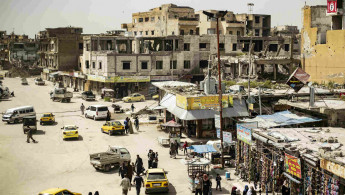IS 'alive and well' in Syria's Raqqa after deadly attack
Several other militiamen and civilians were injured in the attack, the group said, the two fighters killed were women.
The Islamic State group, who claimed Raqqa as the capital of their so-called caliphate from 2014-2017, claimed responsibility for the attacks.
The group said it detonated three explosive devices, leading to ten casualties among SDF ranks without specifying if the victims had been killed or wounded.
Read more: Who did what to defeat the Islamic State group
The international coalition based in northern Syria said two helicopters had been deployed to search for the assailants, according to RIBSS.
The security branch of the SDF arrested ten young men following the attacks, local sources said.
Twitter Post
|
Raqqa has witnessed a continuous campaign of assassinations and bombings, mostly targeting the SDF leadership. The violence has resulted in casualties among the militia as well as among civilians.
The SDF, backed by the US and the international coalition, played a key role in eradicating IS in Syria, including the liberation of Raqqa in 2017.
However, militant sleeper cells persist, hiding out in the surrounding deserts of eastern Syria and attacking the prevailing authorities using guerrilla-style tactics.
The rule of the SDF over majority-Arab parts of Syria has also sown discord among civilians, many of whom say they live under Kurdish occupation.
Demonstrations have broken out in recent months, led by local Arab tribal leaders, demanding better services, jobs, and a bigger role in decision making in the region.
Follow us on Twitter: @The_NewArab





 Follow the Middle East's top stories in English at The New Arab on Google News
Follow the Middle East's top stories in English at The New Arab on Google News
![Both Hamas and the Palestinian Authority welcomed the ICC arrest warrants [Getty]](/sites/default/files/styles/image_330x185/public/2024-11/GettyImages-2178351173.jpg?h=199d8c1f&itok=TV858iVg)

